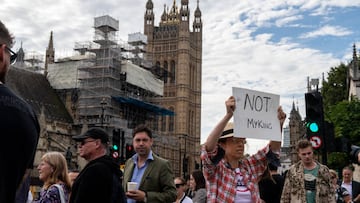Why are people being arrested for protesting the accession of Charles III?
A number of protestors have been spoken to by police for the opposition to the new king, drawing parallels to Russian opposition of the war in Ukraine.


The end of one royal reign has provided the oportunity to discuss the institution’s future, but you wouldn’t know with the wall-to-wall coverage of the pomp and circumstance of tradition. Public opposition to the monarchy has remained small though the first inklings of discontent have appeared as the queen makes her final journey to London.
The police have been excersising new powers granted to them by the Police, Crime, Sentencing and Courts Act. Police can arrest single-person protests if the officer deems the protest to be a disruption, with very broad conditions. Essentially anyone conducting a protest is at risk of arrest.
In one case, a member of the public holding a blank piece of paper was threatened with arrest.
— Paul Powlesland (@paulpowlesland) September 12, 2022
“Officer came and asked for my details.” tweeted barrister Paul Powlesland, “He confirmed that if I wrote ‘Not My King’ on it, he would arrest me under the Public Order Act because someone might be offended.”
This threat harkens back to the Russian people’s protest against their nation’s invasion of Ukraine. Protestors with empty placards were arrested for their opposition despite no words against the war were written or uttered.
🔴An anti-Royal protestor holding a poster with the slogan ‘Not my king’ has been pictured being led away by police 👇 pic.twitter.com/qsur4TT6vz
— Evening Standard (@standardnews) September 12, 2022
Another protestor called out to Prince Andrew as he passed in an Edinburgh street shouting “Andrew, you’re a sick old man!”. The protestor was hauled down by a member of the public and arrested. A 22-year-old woman was also arrested on Sunday during the accession proclamation of King Charles III.
I’m in the ‘God Save the King’ camp, but a kid wanting to protest against the monarchy? Is that an arrestable offence in a country that cherishes free speech?
— Jon Sopel (@jonsopel) September 12, 2022
Sincerely hope not https://t.co/DQaez4W6FH
How strong is support for republicanism in the UK?
While support for the monarchy remains the position for the vast majority, support has been slowly waning in the last four decades.
Before the Queen's death, just under a quarter of Brits favoured a Republic. Support was highest amongst young people (31%) and was lowest amongst older voters (13%). pic.twitter.com/jynJEBxUAR
— Novara Media (@novaramedia) September 12, 2022
Related stories
The campaign Republic, which unsurprisingly demands a referendum on abolishing the monarchy, called for an “open and free debate” on the future of the kingdom, saying many people objected to the accession of Charles III “without debate or consent”.
Spokesperson Graham Smith added, “We are deeply concerned to see people being arrested for peaceful protest. The police, media and politicians all need to understand that the accession is a contentious event and people have the right to speak up and be heard.”

